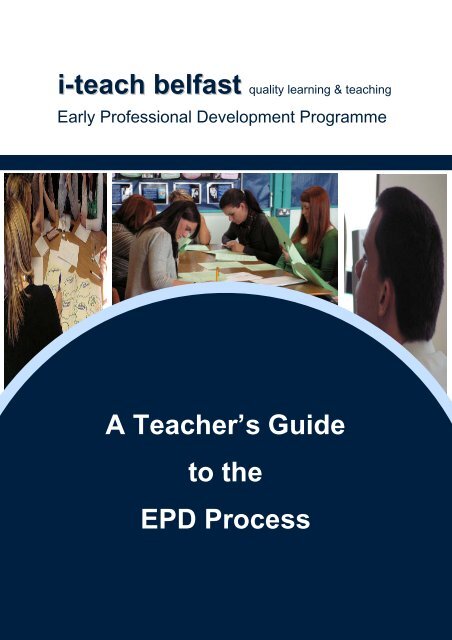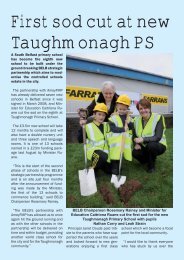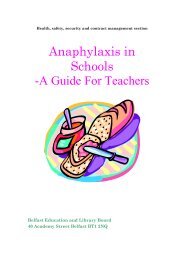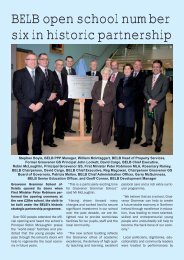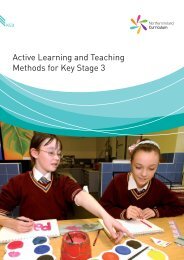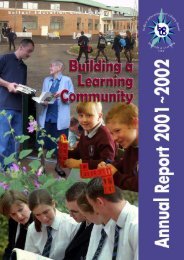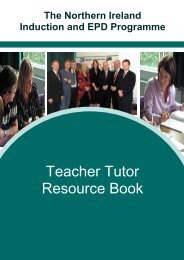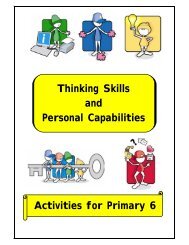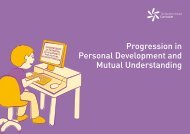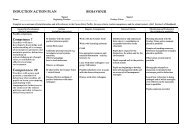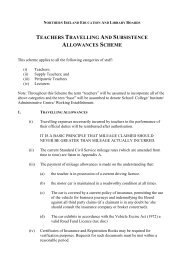A Teachers Guide to the EPD Process - Belfast Education & Library ...
A Teachers Guide to the EPD Process - Belfast Education & Library ...
A Teachers Guide to the EPD Process - Belfast Education & Library ...
You also want an ePaper? Increase the reach of your titles
YUMPU automatically turns print PDFs into web optimized ePapers that Google loves.
i-teach belfast quality learning & teaching<br />
Early Professional Development Programme<br />
A Teacher’s <strong>Guide</strong><br />
<strong>to</strong> <strong>the</strong><br />
<strong>EPD</strong> <strong>Process</strong><br />
1<br />
BELB Induction/<strong>EPD</strong> Support Programme
Early Professional Development Support Programme 2013-14<br />
Contents<br />
Early Professional Development Overview 03<br />
<strong>EPD</strong> Requirements 03<br />
<strong>EPD</strong> Portfolio Overview 04<br />
<strong>EPD</strong> Portfolio Framework 06<br />
including <strong>the</strong> Professional Development Activity<br />
Key Stages in <strong>the</strong> <strong>EPD</strong> <strong>Process</strong> 10<br />
The Role of <strong>the</strong> Teacher Tu<strong>to</strong>r 11<br />
The Role of <strong>the</strong> Principal 12<br />
The Role of <strong>the</strong> Board of Governors 13<br />
The Role of <strong>the</strong> <strong>Education</strong> and <strong>Library</strong> Board 13<br />
Contacts 14<br />
What <strong>to</strong> do if … 15<br />
2<br />
A Teacher’s <strong>Guide</strong> <strong>to</strong> <strong>the</strong> <strong>EPD</strong> <strong>Process</strong><br />
July 2013 edition
Early Professional Development Support Programme 2013-14<br />
<strong>EPD</strong> Overview<br />
Early Professional Development (<strong>EPD</strong>) lasts two years and is <strong>the</strong> third stage of <strong>the</strong><br />
continuous integrated process of teacher education following Initial Teacher <strong>Education</strong><br />
and Induction. <strong>EPD</strong> sees <strong>the</strong> focus of reflection shift from thinking about teaching <strong>to</strong><br />
thinking about learning and is designed <strong>to</strong> ensure that teachers continue <strong>to</strong> receive <strong>the</strong><br />
support from within <strong>the</strong> teaching profession which is characteristic of <strong>the</strong> best practice of<br />
professional development.<br />
Similar <strong>to</strong> <strong>the</strong> Induction stage, <strong>the</strong> <strong>EPD</strong> stage is not an option but an essential part of<br />
‘fur<strong>the</strong>r training and professional development’ in which all teachers are required<br />
<strong>to</strong> participate.’<br />
(Reference: Teacher <strong>Education</strong> Partnership Handbook, DE, Aug 2010 edition, p 90)<br />
<strong>EPD</strong> Requirements<br />
Requirements of Early Professional Development<br />
Upon completion of Induction you are required <strong>to</strong>:<br />
register online for <strong>EPD</strong> with your local <strong>Education</strong> and <strong>Library</strong> Board for each<br />
of <strong>the</strong> two years of <strong>the</strong> programme. Online registration can be completed<br />
at http://www.education-support.org.uk/teachers/iepd/belb/<br />
identify and regularly review your professional development needs within <strong>the</strong><br />
school context in consultation with your Teacher-Tu<strong>to</strong>r and/or o<strong>the</strong>r<br />
recognised supporting teacher(s) who is/are responsible for moni<strong>to</strong>ring and<br />
quality assuring your work and progress<br />
compile, in consultation with your Teacher-Tu<strong>to</strong>r or recognised supporting<br />
teacher, a portfolio of evidence of ongoing professional development<br />
including two classroom research based Professional Development Activities<br />
3<br />
A Teacher’s <strong>Guide</strong> <strong>to</strong> <strong>the</strong> <strong>EPD</strong> <strong>Process</strong><br />
July 2013 edition
Early Professional Development Support Programme 2013-14<br />
<br />
<br />
(PDAs) alongside evidence of participation in in-service training and extra<br />
curricular activities, as appropriate<br />
complete 2 Professional Development Activities (PDAs) over 2 years (1 in<br />
<strong>EPD</strong> 1 and a second in <strong>EPD</strong> 2) which should be linked <strong>to</strong> identified<br />
professional needs and <strong>to</strong> <strong>the</strong> GTCNI teacher competences. Both <strong>the</strong>se<br />
PDAs should focus on learning and teaching with <strong>the</strong> inclusion of <strong>Education</strong><br />
Technology <strong>to</strong> support learning. As with <strong>the</strong> Induction Action Plan, <strong>the</strong> <strong>EPD</strong><br />
Professional Development Activity lends itself naturally <strong>to</strong> <strong>the</strong> school<br />
improvement agenda which advocates that teachers should, as part of <strong>the</strong><br />
self evaluation and capacity building process, agree, implement and review<br />
an annual plan <strong>to</strong> facilitate <strong>the</strong>ir professional development.<br />
complete <strong>the</strong> <strong>EPD</strong> stage successfully in order <strong>to</strong> be able <strong>to</strong> progress <strong>to</strong><br />
PRSD.<br />
<strong>EPD</strong> Portfolio<br />
<strong>EPD</strong> Portfolio Presentation Format<br />
The Teacher e-Portfolio Working Group for Nor<strong>the</strong>rn Ireland defines a portfolio as:<br />
‘A collection of au<strong>the</strong>ntic and diverse evidence of teaching competence<br />
that has been <strong>the</strong> subject of reflection, syn<strong>the</strong>sis and selection for<br />
presentation <strong>to</strong> a professional audience for a professional purposes.’<br />
Teacher e‐Portfolio Project for Nor<strong>the</strong>rn Ireland<br />
http://www.tepni.com<br />
This is similar <strong>to</strong> <strong>the</strong> DfES definition which defines a portfolio as:<br />
‘… a confidential and voluntary collection of material that records and<br />
reflects your work. It is a way of using past experiences and present<br />
activities <strong>to</strong> demonstrate and reflect on skills learnt, <strong>to</strong> identify future<br />
learning needs and priorities and <strong>to</strong> inform and plan prospective<br />
development. It provides a mechanism, <strong>to</strong>ge<strong>the</strong>r with performance<br />
review, for thinking about your practice in a planned and systematic way.’<br />
DfES: Guidance on Producing a Professional Development Record<br />
www.dfes.gov.uk/teachers/professional_development<br />
www.teachernet.gov.uk/professionaldevelopment<br />
4<br />
A Teacher’s <strong>Guide</strong> <strong>to</strong> <strong>the</strong> <strong>EPD</strong> <strong>Process</strong><br />
July 2013 edition
Early Professional Development Support Programme 2013-14<br />
As with <strong>the</strong> Induction<br />
Portfolio you may present<br />
your <strong>EPD</strong> portfolio in printed<br />
‘Word’ format or in electronic<br />
format. The ‘Word’ version<br />
of <strong>the</strong> framework is available<br />
<strong>to</strong> download from <strong>the</strong> ‘<strong>EPD</strong><br />
Programme Requirements’<br />
page of <strong>the</strong> regional<br />
Induction and <strong>EPD</strong> website<br />
at:<br />
http://www.education-support.org.uk/teachers/beginning-teachers/early-professionaldevelopment/epd-programme-requirements/<br />
The ‘Word’ version of <strong>the</strong> framework contains file dividers and proformas for all of <strong>the</strong><br />
<strong>EPD</strong> forms including <strong>the</strong> Professional Development Activity, in‐service training and<br />
extra‐curricular log.s<br />
Alternatively, if you have been using <strong>the</strong> Pebblepad e-portfolio system <strong>to</strong> present<br />
evidence of your professional development during Induction, <strong>the</strong>n you should aim <strong>to</strong> do<br />
so again for <strong>EPD</strong> so that you can continue <strong>to</strong> build a record of your progression through<br />
this next stage of your career in <strong>the</strong> same place. Usernames and passwords issued<br />
during Initial Teacher Training or Induction will remain <strong>the</strong> same for <strong>the</strong> <strong>EPD</strong> stage<br />
and beyond. There is a direct link <strong>to</strong> <strong>the</strong> Te-PNI PebblePad website from <strong>the</strong> ‘<strong>EPD</strong><br />
Programme Requirements’ page of <strong>the</strong> NIELB website.<br />
The PebblePad ‘e‐portfolio’ system contains online versions of all of <strong>the</strong> <strong>EPD</strong> forms and<br />
reports for your and your <strong>EPD</strong> teacher’s use. These include <strong>the</strong> Professional<br />
Development Activity, PDA and <strong>EPD</strong> Quality Assurance forms as well as classroom<br />
observation proformas and an exemplar <strong>EPD</strong> webfolio. The menu also offers slick<br />
online alternatives <strong>to</strong> proformas in ‘Word’ such as <strong>the</strong> ‘Blog, Thought, Activity’ and<br />
‘Experience’ <strong>to</strong>ols which your <strong>EPD</strong> teacher can use <strong>to</strong> create reflective logs of <strong>the</strong>ir inservice<br />
and extra‐curricular experience as well as <strong>the</strong>ir ‘PDA Learning Log.’<br />
5<br />
A Teacher’s <strong>Guide</strong> <strong>to</strong> <strong>the</strong> <strong>EPD</strong> <strong>Process</strong><br />
July 2013 edition
Early Professional Development Support Programme 2013-14<br />
<strong>EPD</strong> Portfolio Framework<br />
<strong>EPD</strong> Portfolio Framework<br />
The following suggested framework is offered <strong>to</strong> you as a possible way <strong>to</strong> structure<br />
your <strong>EPD</strong> portfolio of evidence, whe<strong>the</strong>r in printed ‘Word’ format or in e-portfolio<br />
format. You should feel free <strong>to</strong> personalise and adapt it for your own use while<br />
taking care <strong>to</strong> ensure that <strong>the</strong> end product contains evidence of <strong>the</strong> core <strong>EPD</strong><br />
requirement of reflective practice in <strong>the</strong> context of 2 Professional Development<br />
Activities (PDAs).<br />
Section 1: Personal/School Profile<br />
Personal Details<br />
School Details – information on <strong>the</strong> school(s) in which you are carrying<br />
out your <strong>EPD</strong>, if different from Induction, and a brief description of your<br />
teaching remit<br />
<br />
Section 2: Continuing Professional Development during <strong>EPD</strong><br />
A Record of Professional Development during <strong>EPD</strong><br />
A Record of Extra Curricular Involvement during <strong>EPD</strong><br />
A Classroom Observation Log with notes of observations of o<strong>the</strong>r<br />
teachers in your own and/or in o<strong>the</strong>r schools which may support your<br />
holistic professional development and/or your planning and delivery of <strong>the</strong><br />
<strong>EPD</strong> (PDAs), where applicable<br />
6<br />
Section 3: Professional Development Activity 1<br />
This is <strong>the</strong> first of <strong>the</strong> two Professional Development Activities (PDAs) which<br />
you will carry out over <strong>the</strong> 2 years of <strong>EPD</strong>, one in <strong>EPD</strong> 1 and one in <strong>EPD</strong> 2.<br />
The PDA structure allows your Teacher Tu<strong>to</strong>r or recognised supporting<br />
teacher <strong>to</strong> record <strong>the</strong>ir agreement at key points in <strong>the</strong> process and guides you<br />
in <strong>the</strong> evidencing of your work using <strong>the</strong> ‘plan, teach, review, reflect’ model<br />
under <strong>the</strong> following headings:<br />
<br />
Planning for Teaching and Learning<br />
‣ My Professional Needs as a Teacher in <strong>the</strong> context of school,<br />
departmental or key stage priorities<br />
‣ PDA Details – Your chosen ‘Topic, Focus’ and ‘Purpose’<br />
A Teacher’s <strong>Guide</strong> <strong>to</strong> <strong>the</strong> <strong>EPD</strong> <strong>Process</strong><br />
July 2013 edition
Early Professional Development Support Programme 2013-14<br />
<br />
‣ Planning for Learning – Details of <strong>the</strong> class or group of pupils with<br />
whom <strong>the</strong> PDA will be carried out, <strong>the</strong> intended learning outcomes,<br />
background reading, teaching content, strategies and resources<br />
Supporting evidence of planning such as unit planners or schemes of work<br />
may be included as attachments in hard copy portfolio format or as<br />
hyperlinks in e-portfolio format <strong>to</strong> fur<strong>the</strong>r exemplify content and intended<br />
use of teaching strategies and resources<br />
Teaching for Learning<br />
‣ Lesson Plans for Observed Lessons<br />
‣ Reflective Self-Evaluation of Lessons<br />
‣ Evidence of Pupils Learning – you should collect 3 sources of evidence<br />
<strong>to</strong> enable you <strong>to</strong> moni<strong>to</strong>r <strong>the</strong> progress of your pupils. All evidence<br />
should be annotated and relate <strong>to</strong> your chosen focus, purpose and<br />
competences<br />
Evidence 1 should be written observation feedback from your<br />
Teacher Tu<strong>to</strong>r or o<strong>the</strong>r recognised supporting teacher<br />
Evidence 2 and 3 may be sourced from any of <strong>the</strong> following:<br />
- Written self evaluations of lessons delivered and/or observations<br />
of pupils’ learning<br />
- Pupils’ work, including evidence of <strong>the</strong>ir use of <strong>Education</strong>al<br />
Technology, if appropriate<br />
- Pupil feedback e.g. questionnaires, recorded interviews<br />
- Videos, audio recordings, pho<strong>to</strong>graphs<br />
NB: The e-portfolio system more easily facilitates and supports <strong>the</strong><br />
inclusion of this type of digital evidence<br />
<br />
‣ PDA 1 Learning Log – this should log any significant moments during<br />
<strong>the</strong> PDA delivery which may challenge you <strong>to</strong> think more critically<br />
about your pupils’ learning and <strong>the</strong>ir role in <strong>the</strong> learning process<br />
Review of My Teaching - A brief record of <strong>the</strong> outcomes of your<br />
discussion of all of <strong>the</strong> above evidence with your Teacher Tu<strong>to</strong>r or<br />
recognised supporting teacher<br />
7<br />
A Teacher’s <strong>Guide</strong> <strong>to</strong> <strong>the</strong> <strong>EPD</strong> <strong>Process</strong><br />
July 2013 edition
Early Professional Development Support Programme 2013-14<br />
<br />
<br />
<br />
Reflection on My Teaching – You should use <strong>the</strong> evidence and<br />
outcomes of <strong>the</strong> review discussion <strong>to</strong> make judgements about <strong>the</strong> learning<br />
and teaching process and <strong>to</strong> ascertain <strong>the</strong> extent <strong>to</strong> which <strong>the</strong> focus and<br />
purpose of your PDA have been achieved.<br />
Quality Assurance of PDA 1 – This provides a formal mechanism for<br />
your Principal and Teacher Tu<strong>to</strong>r <strong>to</strong> verify that you are developing as a<br />
skilful and reflective practitioner. The completed PDA, <strong>to</strong>ge<strong>the</strong>r with <strong>the</strong><br />
supporting evidence, will be an important source of validation in <strong>the</strong> quality<br />
assurance process, conducted internally by Senior Management in your<br />
school and also externally, during inspection situations, by <strong>the</strong> <strong>Education</strong><br />
and Training Inspec<strong>to</strong>rate of <strong>the</strong> Department of <strong>Education</strong>. (Reference:<br />
Teacher <strong>Education</strong> Partnership Handbook, Section 5.9)<br />
Confirmation of Completion of PDA1 - This provides formal confirmation<br />
by your school principal that you have successfully completed PDA 1<br />
Section 4: Professional Development Activity 2<br />
This second PDA should be carried out in <strong>EPD</strong> 2. Ideas for <strong>the</strong> focus and<br />
purpose for this second PDA may emerge from your evaluation of and<br />
reflection on PDA 1 as well as <strong>the</strong> outcomes of <strong>the</strong> formal quality<br />
assurance process. Your focus and purpose may also emerge from<br />
targets identified in school, key stage or departmental priorities<br />
<br />
The same ‘Plan, Teach, Review, Reflect’ model should be engaged in as<br />
for PDA 1, as detailed above under <strong>the</strong> headings of:<br />
‣ Planning for Teaching and Learning<br />
‣ Teaching for Learning<br />
‣ Review of my Teaching<br />
‣ Reflection on my Teaching<br />
‣ Summative Self-Reflection on Action Plan 2<br />
‣ Quality Assurance of PDA 2<br />
‣ Confirmation of Completion of PDA 2<br />
8<br />
A Teacher’s <strong>Guide</strong> <strong>to</strong> <strong>the</strong> <strong>EPD</strong> <strong>Process</strong><br />
July 2013 edition
Early Professional Development Support Programme 2013-14<br />
<br />
Section 5: Completion of <strong>EPD</strong><br />
Letter <strong>to</strong> Confirm Successful Completion of <strong>EPD</strong> - this letter is signed<br />
by <strong>the</strong> Principal and <strong>the</strong> Chair of <strong>the</strong> Board of Governors in <strong>the</strong> school in<br />
which you will have completed <strong>the</strong> <strong>EPD</strong> programme. Your school should<br />
complete <strong>the</strong> letter using <strong>the</strong> wording provided on school headed<br />
notepaper, send it <strong>to</strong> <strong>the</strong> GTCNI <strong>to</strong> confirm your successful completion of<br />
<strong>EPD</strong>, give a copy <strong>to</strong> you and send a fur<strong>the</strong>r copy <strong>to</strong> <strong>the</strong> Induction/<strong>EPD</strong><br />
team at <strong>the</strong> BELB or in <strong>the</strong> appropriate <strong>Education</strong> and <strong>Library</strong> Board<br />
(Reference: Teacher <strong>Education</strong> Partnership Handbook, Section 5.11)<br />
9<br />
A Teacher’s <strong>Guide</strong> <strong>to</strong> <strong>the</strong> <strong>EPD</strong> <strong>Process</strong><br />
July 2013 edition
Early Professional Development Support Programme 2013-14<br />
Key Stages in <strong>the</strong> <strong>EPD</strong> <strong>Process</strong><br />
Early Professional Development<br />
School registers <strong>the</strong> <strong>EPD</strong> teacher and Teacher Tu<strong>to</strong>r with <strong>the</strong> ELB for training<br />
Professional Development Activity 1 (<strong>EPD</strong> year 1)<br />
Plan and deliver PDA 1 following <strong>the</strong> structure and guidance provided<br />
Completion of Professional Development Activity 1<br />
Professional Development Activity 2 (<strong>EPD</strong> year 2)<br />
Plan and deliver PDA 2 following <strong>the</strong> structure and guidance provided<br />
Completion of Professional Development Activity 2<br />
Successful Completion of Early Professional Development<br />
(End of <strong>EPD</strong> 2)<br />
On <strong>the</strong> recommendation of <strong>the</strong> principal and confirmed by <strong>the</strong> Board of Governors a copy of<br />
<strong>the</strong> letter of completion of <strong>EPD</strong> should be:<br />
given <strong>to</strong> <strong>the</strong> <strong>EPD</strong> 2 teacher<br />
retained by <strong>the</strong> school<br />
forwarded <strong>to</strong> The General Teaching Council for Nor<strong>the</strong>rn Ireland, 3 rd Floor, Albany<br />
House, 73-75 Great Vic<strong>to</strong>ria Street, <strong>Belfast</strong>, BT2 7AF<br />
Forwarded <strong>to</strong> <strong>the</strong> Induction/<strong>EPD</strong> Team at <strong>the</strong> local ELB<br />
Figure 3: The Early Professional Development <strong>Process</strong><br />
10<br />
A Teacher’s <strong>Guide</strong> <strong>to</strong> <strong>the</strong> <strong>EPD</strong> <strong>Process</strong><br />
July 2013 edition
Early Professional Development Support Programme 2013-14<br />
The Role of Teacher Tu<strong>to</strong>r<br />
Your Teacher Tu<strong>to</strong>r or recognised supporting teacher should carry out <strong>the</strong><br />
following in support of you through <strong>the</strong> <strong>EPD</strong> process:<br />
coordinate, manage, moni<strong>to</strong>r and evaluate, in liaison with <strong>the</strong> Principal,<br />
your <strong>EPD</strong> programme in school<br />
be a firm advocate <strong>to</strong> all in authority on behalf of you<br />
provide guidance <strong>to</strong> o<strong>the</strong>r key members of staff in school who also<br />
support your development through <strong>the</strong> <strong>EPD</strong> stage of <strong>the</strong> Beginning<br />
Teacher programme<br />
ensure that you register for <strong>EPD</strong><br />
create an open, supportive and challenging climate<br />
provide you with information which outlines, for example, school aims,<br />
routines, policies and procedures on Child Protection, Health and Safety<br />
and Special <strong>Education</strong>al Needs. Much of this information will be<br />
contained in <strong>the</strong> school’s staff handbook<br />
help you <strong>to</strong> identify your professional development needs within <strong>the</strong><br />
context of <strong>the</strong> school and <strong>the</strong> classes you teach and ensure that <strong>the</strong>se<br />
are supported effectively<br />
guide you in your choice of appropriate ‘Foci’ for your <strong>EPD</strong> PDAs<br />
support you in <strong>the</strong> planning process and in <strong>the</strong> selection and evaluation<br />
of sources of evidence<br />
moni<strong>to</strong>r and quality assure your progress through direct classroom<br />
observation of your work and provide you with regular feedback and<br />
suggestions for fur<strong>the</strong>r development<br />
support you, through observation and discussion, in <strong>the</strong> important<br />
process of review and reflection, encouraging you <strong>to</strong> reflect critically on<br />
your teaching and on <strong>the</strong> quality of your pupils’ learning<br />
keep <strong>the</strong> Principal and o<strong>the</strong>r key members of staff informed of your<br />
progress<br />
recommend <strong>to</strong> <strong>the</strong> Principal, as appropriate, your successful completion<br />
of <strong>EPD</strong><br />
11<br />
A Teacher’s <strong>Guide</strong> <strong>to</strong> <strong>the</strong> <strong>EPD</strong> <strong>Process</strong><br />
July 2013 edition
Early Professional Development Support Programme 2013-14<br />
The Role of <strong>the</strong> Principal<br />
The main responsibilities of <strong>the</strong> Principal in support of you as a Beginning<br />
Teacher are <strong>to</strong>:<br />
raise whole staff awareness of <strong>the</strong> requirements of <strong>the</strong> Beginning Teacher<br />
Programme and of whole school responsibility <strong>to</strong> support you<br />
moni<strong>to</strong>r <strong>the</strong> Beginning Teacher programme in school <strong>to</strong> ensure high<br />
quality and consistent provision<br />
keep <strong>the</strong> Board of Governors informed of <strong>the</strong> support arrangements in<br />
place for you and any o<strong>the</strong>r Beginning <strong>Teachers</strong> in school<br />
ensure that <strong>the</strong>re are effective mechanisms in place <strong>to</strong> support you<br />
through <strong>the</strong> requirements of <strong>EPD</strong> in particular and as a member of <strong>the</strong><br />
staff team in general, e.g. adequate time and resources<br />
ensure that your Teacher Tu<strong>to</strong>r and o<strong>the</strong>r key staff have adequate time <strong>to</strong><br />
work with you and support you;<br />
facilitate your attendance at <strong>the</strong> ELB <strong>EPD</strong> INSET programme<br />
meet with you and your Teacher Tu<strong>to</strong>r <strong>to</strong> help you identify development<br />
needs and discuss your progress<br />
encourage you by taking a close interest in your work including your <strong>EPD</strong><br />
portfolios<br />
<br />
consider <strong>the</strong> potential of dissemination of <strong>the</strong> outcomes of your <strong>EPD</strong> PDAs<br />
for <strong>the</strong> benefit of whole staff development in school<br />
countersign, with your Teacher Tu<strong>to</strong>r, <strong>the</strong> <strong>EPD</strong> Quality Assurance and<br />
Completion of PDA reports<br />
recommend <strong>to</strong> <strong>the</strong> Board of Governors, when appropriate, that you have,<br />
successfully completed <strong>the</strong> <strong>EPD</strong> stage and countersign <strong>the</strong> letter of<br />
completion with <strong>the</strong> Chair of <strong>the</strong> Board of Governors<br />
send a copy of <strong>the</strong> ‘Completion of <strong>EPD</strong>’ letter, when appropriate, <strong>to</strong> <strong>the</strong><br />
GTCNI, Albany House, 3rd Floor, 73-75 Great Vic<strong>to</strong>ria Street, <strong>Belfast</strong>,<br />
BT2 7AF and <strong>to</strong> <strong>the</strong> Induction/<strong>EPD</strong> Team at <strong>the</strong> BELB. A copy of <strong>the</strong><br />
letter should also be given <strong>to</strong> you for your own records<br />
<br />
celebrate within <strong>the</strong> school your successful completion of <strong>the</strong> <strong>EPD</strong> stage<br />
of <strong>the</strong> Beginning Teacher Programme<br />
12<br />
A Teacher’s <strong>Guide</strong> <strong>to</strong> <strong>the</strong> <strong>EPD</strong> <strong>Process</strong><br />
July 2013 edition
Early Professional Development Support Programme 2013-14<br />
The Role of <strong>the</strong> Governors<br />
In order for <strong>the</strong> Board of Governors <strong>to</strong> confirm, or o<strong>the</strong>rwise, your<br />
successful completion of <strong>EPD</strong>, it will be important for <strong>the</strong>m <strong>to</strong>:<br />
be informed of <strong>the</strong> programme which is in place in school <strong>to</strong> support you<br />
through <strong>the</strong> <strong>EPD</strong> stage of <strong>the</strong> Beginning Teacher Programme<br />
receive regular reports on your progress<br />
have access, as appropriate, <strong>to</strong> your <strong>EPD</strong> portfolio of evidence<br />
The Role C A of S <strong>the</strong> S ELB<br />
13<br />
The ELB Curriculum Advisory and Support Service (CASS)<br />
The <strong>Belfast</strong> <strong>Education</strong> and <strong>Library</strong> Board’s Induction and <strong>EPD</strong> team designs<br />
and delivers, in conjunction with o<strong>the</strong>r colleagues in <strong>the</strong> local and regional<br />
CASS teams, a dedicated programme of in-service training (INSET) for<br />
Beginning <strong>Teachers</strong> in <strong>the</strong> Induction and <strong>EPD</strong> stages. CASS provides:<br />
a differentiated local programme of in-service training based on <strong>the</strong><br />
identified needs of BTs in each ELB area<br />
a coordinated regional in-service programme <strong>to</strong> meet <strong>the</strong> needs of BTs in<br />
primary, post-primary, special and nursery schools across all ELB areas<br />
school-based support <strong>to</strong> assist BTs in <strong>the</strong> implementation of <strong>the</strong> ‘plan,<br />
teach, review, reflect’ cycle<br />
school and centre-based training and support for Teacher-Tu<strong>to</strong>rs and<br />
Principals in <strong>the</strong> management and co-ordination of <strong>the</strong> Induction and <strong>EPD</strong><br />
A Teacher’s <strong>Guide</strong> <strong>to</strong> <strong>the</strong> <strong>EPD</strong> <strong>Process</strong><br />
July 2013 edition
Early Professional Development Support Programme 2013-14<br />
programme including guidance on observing lessons and giving<br />
feedback<br />
guidance <strong>to</strong> schools with BTs who may require more intensive support<br />
support for teachers re-entering <strong>the</strong> profession and also for teachers who<br />
qualified outside Nor<strong>the</strong>rn Ireland<br />
Contacts<br />
Contacts<br />
<strong>Belfast</strong> <strong>Education</strong> and <strong>Library</strong> Board<br />
Gillian Stewart<br />
Nursery/Primary/<br />
Post Primary/Special<br />
Tel: 90 564304<br />
Fax: 90 564078<br />
gillian.stewart@belb.co.uk<br />
Ka<strong>the</strong>rine Jelly<br />
Nursery/Primary/<br />
Special<br />
Tel: 90 564189<br />
Fax: 90 564078<br />
ka<strong>the</strong>rine.jelly@belb.co.uk<br />
Regional Induction/<strong>EPD</strong> website:<br />
http://www.education-support.org.uk/teachers/iepd/<br />
14<br />
A Teacher’s <strong>Guide</strong> <strong>to</strong> <strong>the</strong> <strong>EPD</strong> <strong>Process</strong><br />
July 2013 edition
Early Professional Development Support Programme 2013-14<br />
What <strong>to</strong> do if …<br />
You are employed in<br />
a school for a year<br />
or more:<br />
What <strong>to</strong> do if …<br />
Ensure that you are registered for <strong>EPD</strong> with <strong>the</strong> <strong>Education</strong> and<br />
<strong>Library</strong> Board in which <strong>the</strong> school is located<br />
Link with <strong>the</strong> school’s Teacher Tu<strong>to</strong>r and participate in <strong>the</strong><br />
CASS programme<br />
Draw up, in consultation with <strong>the</strong> Teacher Tu<strong>to</strong>r a Professional<br />
Development Activity linked <strong>to</strong> identified professional and<br />
classroom needs, core criteria and teacher competences<br />
Implement <strong>the</strong> PDA<br />
Collect evidence of increasing professional competence in an<br />
<strong>EPD</strong> portfolio which should be presented <strong>to</strong> <strong>the</strong> Principal and<br />
<strong>the</strong> Chair of <strong>the</strong> Board of Governors<br />
You are employed<br />
for a period of at<br />
least 10 weeks:<br />
<br />
<br />
<br />
<br />
<br />
Ensure that you are registered for <strong>EPD</strong> with <strong>the</strong> <strong>Education</strong><br />
and <strong>Library</strong> Board in which <strong>the</strong> school is located<br />
Link with <strong>the</strong> school’s Teacher Tu<strong>to</strong>r and participate in <strong>the</strong><br />
CASS programme<br />
Draw up, in consultation with <strong>the</strong> Teacher Tu<strong>to</strong>r a<br />
Professional Development Activity linked <strong>to</strong> identified<br />
professional and classroom needs, core criteria and teacher<br />
competences<br />
Implement <strong>the</strong> PDA<br />
Collect evidence of increasing professional competence in an<br />
<strong>EPD</strong> portfolio which should be presented <strong>to</strong> <strong>the</strong> Principal and<br />
<strong>the</strong> Chair of <strong>the</strong> Board of Governors<br />
You are initially<br />
appointed as<br />
substitute teachers<br />
for fewer than 4<br />
weeks but whose<br />
contracts are<br />
extended<br />
incrementally, at <strong>the</strong><br />
end of 4 weeks:<br />
You are involved in<br />
day <strong>to</strong> day<br />
substitute teaching:<br />
Alert <strong>the</strong> Principal and/or Teacher Tu<strong>to</strong>r <strong>to</strong> your position and <strong>to</strong><br />
<strong>the</strong> need for discussion of <strong>EPD</strong> requirements should <strong>the</strong><br />
contract be extended<br />
Register with <strong>the</strong> <strong>Education</strong> and <strong>Library</strong> Board explaining your<br />
circumstances<br />
Compile a careful record of <strong>the</strong> range of teaching experiences<br />
gained and a log of professional development activities<br />
engaged in including details of school and centre-based<br />
courses<br />
It is difficult for Beginning <strong>Teachers</strong> who are carrying out day-<strong>to</strong>day<br />
substitute teaching <strong>to</strong> engage with <strong>the</strong> breadth of <strong>the</strong> teacher<br />
competence framework and <strong>to</strong> participate fully in <strong>the</strong> <strong>EPD</strong><br />
programme. However, in this situation you should:<br />
Register with <strong>the</strong> <strong>Education</strong> and <strong>Library</strong> Board where you live<br />
so that you can receive professional development information<br />
Keep a careful record of <strong>the</strong> range of teaching experiences<br />
gained<br />
Keep a log of your development in relation <strong>to</strong> <strong>the</strong> core criteria<br />
and teacher competence framework with particular reference<br />
<strong>to</strong> demonstration of professional development<br />
15<br />
A Teacher’s <strong>Guide</strong> <strong>to</strong> <strong>the</strong> <strong>EPD</strong> <strong>Process</strong><br />
July 2013 edition
‘At <strong>the</strong> heart of being a teacher is, above<br />
all else, being a learner – a lifelong<br />
learner. Only by being a learner will we<br />
be able <strong>to</strong> grow professionally and<br />
personally. To learn, one has <strong>to</strong> ask<br />
questions, of oneself and o<strong>the</strong>rs, and <strong>to</strong><br />
know that this process is valued and<br />
shared … Reflecting on teaching<br />
provides a focus for analysing and<br />
developing learning and teaching.’<br />
The Teacher <strong>Education</strong> Partnership Handbook<br />
(De, Aug 2010 edition, p 90)<br />
BELB, July 2013 Edition<br />
16<br />
BELB Induction/<strong>EPD</strong> Support Programme


